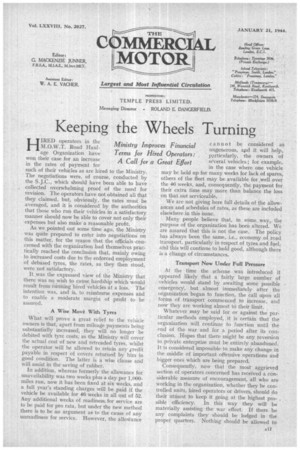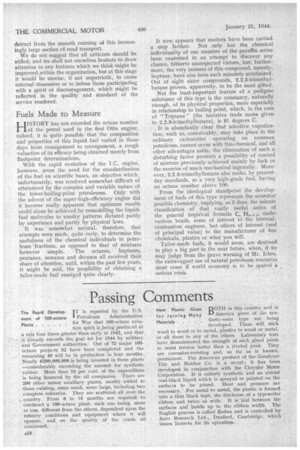Keeping the Wheels Turning H IRED operators in the M.O.W.T. Road
Page 19

Page 20

If you've noticed an error in this article please click here to report it so we can fix it.
Haulage Organization have won their case for an increase in the rates of payment for such of their vehicles as are hired to the Ministry. The negotiations were, of course, conducted by the S. J.C., which should have been able to have collected overwhelming proof of the need for revision. The operators have not obtained all that they claimed, but, obviously, the rates must be averaged, and it is considered by the authorities that those who run their vehicles in a satisfactory manner should now be able to cover not only their expenses but also make a reasonable profit.
As we pointed out some time 'ago, the Ministry was quite prepared to enter into negotiations on this matter, for the reason that the officials \concerned with the organization had themselves ptactically reached the conclusion that, mainly owing to increased costs due to the enforced employment of debased tyres, the rates, as they then stood, were not satisfactory.
It was the expressed view of the Ministry that there was no wish to cause hardship which would result from ithining 'hired vehicles at a loss. The intention was, and is, to reimburse expenses and to enable a moderate margin of profit to be assured.
A Wise Move With Tyres What will prove a great relief to the vehicle owners is that, apart from mileage payments being substantially increased, they will no longer be debited with tyre costs, as the Ministry Will cover the actual cost of new and retreaded tyres, whilst the operator will be allowed to retain any p-edit payable in respect of covers returned by him in good condition. The latter is a wise Clause and will assist in the savingof rubber.
In addition, whereas formerly the allowance for unavailability was two weeks plus a day per 1,000miles run, now it has been fixed at six weeks, and a full year's standing charges will be paid if the vehicle be available for 46 weeks in all out of 52. Any additional weeks of readiness,for service are to be paid for pro rata, but under the new method there is to be no argument as to the cause of any unreadiness for service. However, the alloWance cannot be considered as ungenerous, and it will help, paiticularly, the owners of several vehicles; for example, in the case where one vehicle may be held up for many weeks for lack of spares others of the fleet may be available for well over the 46 weeks, and, consequently, the payment for their extra time may more than balance the loss on that not serviceable.
We are not giving here full details of he allowances and schedules of rates, as these are included elsewhere in this issue. • • Many people believe that, in some way, the purpose of the organization has been altered. We are assured that this is not the case. The policy has always been the same, i.e., economy of road transport, particularly in respect of tyres. and fuel, and this will continue to hold good, although there is a change of circumstances.
Transport Now Under Full Pressure At the time the scheme was introduced it appeared likely that a fairly large number of vehicles would stand by awaiting some possible emergency, but almost immediately after the organization began to function, the call upon all forms of transport cominenced to increase, and now they are working almost tO their limit.
Whatever may be said for or against the particular methods employed, it is certain that the organization will continue to function until the end of tho war .and for a period after its conclusion. Hopes that there might be any reversion to private enterprise mast be entirely abandoned. it is considered impossible to make any change in the middle of important offensive operations and bigger ones which are being prepared.
Consequently, now that the most• aggrieved section of operators concerned has received a considerable measure of encouragement, all who are working in the organization, whether they be controlled units, hired operators or drivers, should do their utmost to keep it going at the highest possible efficiency. In this way they will be materially assisting the war effort. If there be any complaints they should be lodged in the proper quarters. Nothing should be allowed to detract from the smooth running of this increasingly large section of road transport.
We do not suggest that all criticism should be stifled, and we shall not ourselves hesitate to draw attention to any features which we think might be improvekwithin the organization, but at this stage it would be unwise, if not unpatriotic, to cause internal dissension or to imbue those participating with a spirit of discouragement, which might be reflected in the quality and standard of the service rendered.
Fuels .Made to Measure
HISTORY has not. recorded the octane number of the petrol used in the first Otto engine; indeed, it is quite possible that the composition and properties of this liquid fuel varied in those days from consignment to consignment, a rough valuation of its efficacy being obtained merely from flashpoint determinations.
With the rapid evolution of the T.C. engine, however, arose the need for the standardization of the fuel on scientific bases, an objective which, unfortunately, was rendered somewhat difficult of attainment by the complex and variable nature of the lower-boiling-pOint petroleums. Only with the advent of the super-high-efficiency engine did it become really apparent that optimum results could alone be achieved by remodelling the liquidfuel molecules to sundry patterns dictated partly by experience and partly by physical laws.
It was somewhat natural, therefore, that attempts were made, quite early, to determine the usefulness of the chemical individuals in petroleum fractions, as opposed to that of mixtures however simple. The octanes, heptanes, pentanes, nonanes and decanes all received their share of attention, until, within the past few years, itmight be said, the possibility of obtaining a tailor-made fuel emerged quite clearly. It now appears that matters have been carried a step farther. Not only has the chemical individuality of one member of the paraffin series been examined in an attempt to discover any chance, hitherto unsuspected virtues,. but, furthermore, the very isomers of this compound, namely, heptane, have also been each minutely scrutinized. Out of eight sister compounds, 2.2.3-trimethylbutane proves, apparently, to be the most gifted.
Not the least-important feature of a pedigree substance of this type is the constancy, naturally enough, of its physical properties, more especially in relationship to boiling point, which, in the case of ``Triptane " (the tentative trade name given to 2.2.3-trimethylbutane), is 81 degrees C.
It is abundantly clear that selective vaporization, such as, conceivably, may take place in the ordinary carburetter operating on common petroleum, cannot occur with this chemical, and all other advantages aside, the -elimination of such a disturbing factor presents a possibility of control of mixture previously achieved mainly by luck or the exercise of much mechanical ingenuity. Moreover, 2.2.3-trimethylbutane also ranks, by presentday standards, as a very high-grade fuel, having an octane number above 100.
From the ideological standpoint the development of fuels of this type represents the soundest possible chemistry, implying, as it does, the minute classification of that vastly useful series of the general impirical formula C. H,„.4.2, under various heads, some of interest to the internalcombustion engineer, but others of interest (and of principal value) to the manufacturer of fine chemicals, plastics or what you will.
Tailor-made fuels, it would seem, are destined to play a big part in the near future, when, if We may judge from the grave warning of Mr. -Ickes, the extravagant use of natural petroleum resources must cease if world economy is to be spared a serious crisis.




























































